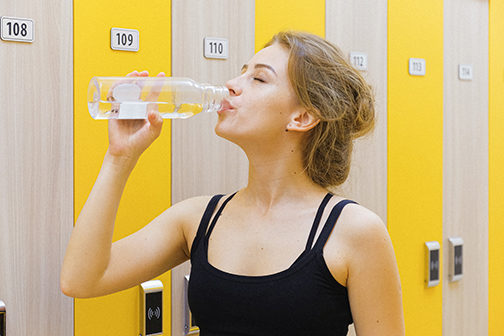


Adequate hydration is vital for good health. You may have heard that everyone needs to drink eight 8-ounce glasses of water daily. That’s not necessarily true. Some people will need more. Others will need less. What you eat, your age, the climate, and your weight are a few factors that affect fluid intake. If you eat juicy food, like watermelon, that is mostly water, it also counts as fluid intake and reduces the amount of fluid necessary to stay hydrated. Your size is an important factor. A 110-pound woman won’t need as much fluid as a 170-pound woman if all other factors are the same.
Water keeps the body functioning.
Babies’ bodies are mostly water. It’s 75% fluid. The older you get, the less fluid your tissues contain. Seniors have the least amount of fluid. It’s a reason they dehydrate quickly. Their body is between 39% and 57% fluid. Fatty tissues contain more fluid than lean muscle mass. Some organs contain more fluid than others do. The brain is 70% water, while the lungs are 83% water. Dehydration affects all major organs. If you’re mildly dehydrated, it can affect the organs, particularly the older you are. Inadequate hydration can lead to breathing problems, irregular heart rhythms, confusion, headaches, and exhaustion.
The size of your body makes a difference.
If you have the same body composition of fat to muscle and are the same age, gender, and activity level, you may need more fluid daily. Compare a 6’5″ man weighing 200 pounds to a 5’4″, 140-pound male. They have the same fat-to-muscle ratio. The only difference is the size. The bigger male will need more fluid to ensure that the muscles, brain, and kidneys have 70% fluid by weight and the lungs have 83%. Eight glasses of water a day may be too much for a smaller person and too little for a larger one.
One simple calculation considers body size.
Water intake calculators can provide a more exact number of ounces you need, but you can also use a simple formula. Use 2/3rds of your body weight as the number of ounces of water you need daily. If you weigh 150 pounds, 2/3rds of that is 100 pounds, and the number of ounces of water daily. It’s more accurate than the generalized 8-glasses a day.
- You need more fluid if you’re hot or sweating from an intense workout. The older you are, the more you’ll need. People who live at higher elevations require more fluid.
- Most people get 20% of their fluid from food. Eating fresh fruits and vegetables can provide a considerable amount of water. The more juicy produce you eat, the less water you need.
- Health issues can affect your need for water. A fever, diarrhea, and vomiting require fluid replacement. You can often identify dehydration by lethargy or, in the case of seniors, symptoms that resemble dementia.
- You can drink too much water. It causes hyponatremia. Check your urine to judge. It should be pale yellow. If it’s too dark, you’re dehydrated. If it’s clear, you’ve consumed too much fluid.
For more information, contact us today at Travel Trim
